Unit 3 Family matters Using ideas 课件(共42张,内嵌音频)-高中英语外研版(2019)必修第一册(共43页PPT)
文档属性
| 名称 | Unit 3 Family matters Using ideas 课件(共42张,内嵌音频)-高中英语外研版(2019)必修第一册(共43页PPT) | 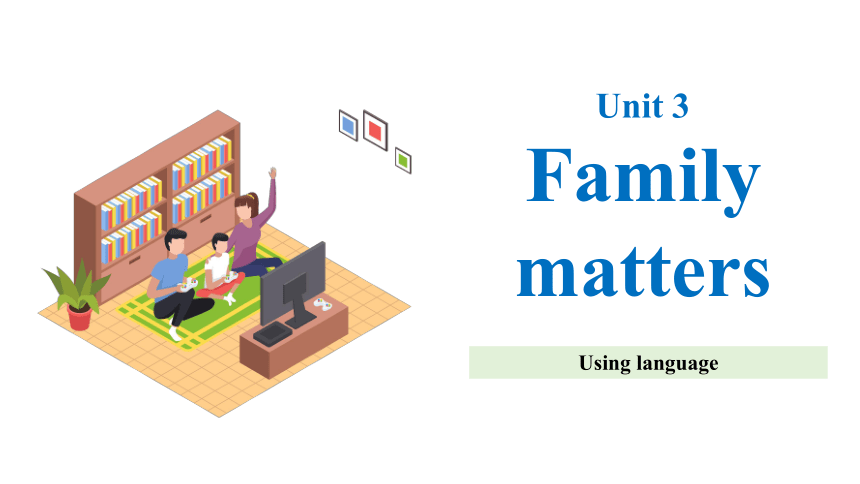 | |
| 格式 | pptx | ||
| 文件大小 | 31.4MB | ||
| 资源类型 | 教案 | ||
| 版本资源 | 外研版(2019) | ||
| 科目 | 英语 | ||
| 更新时间 | 2025-05-22 19:22:09 | ||
图片预览

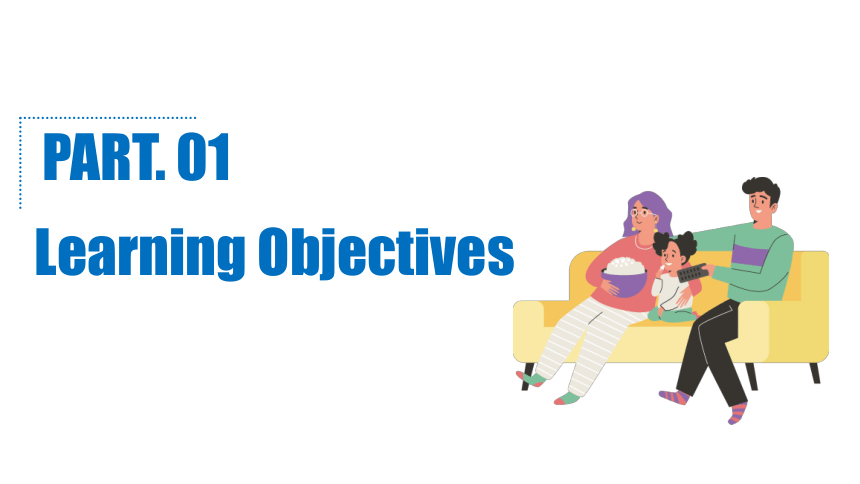
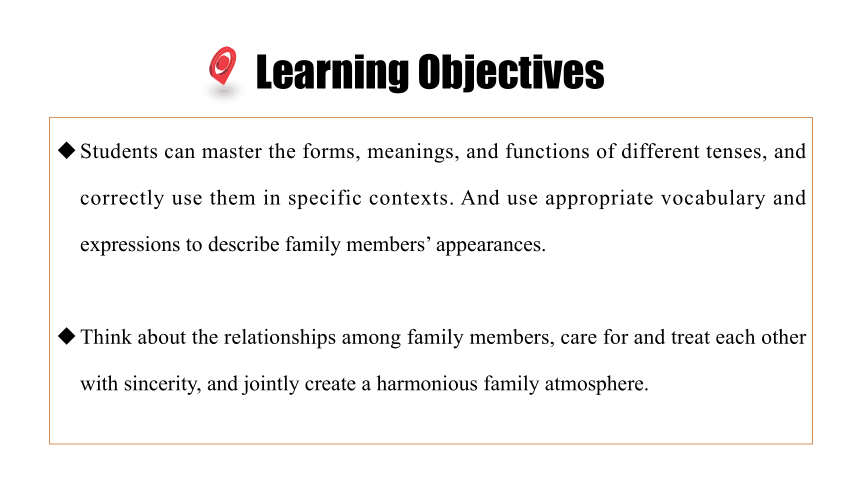
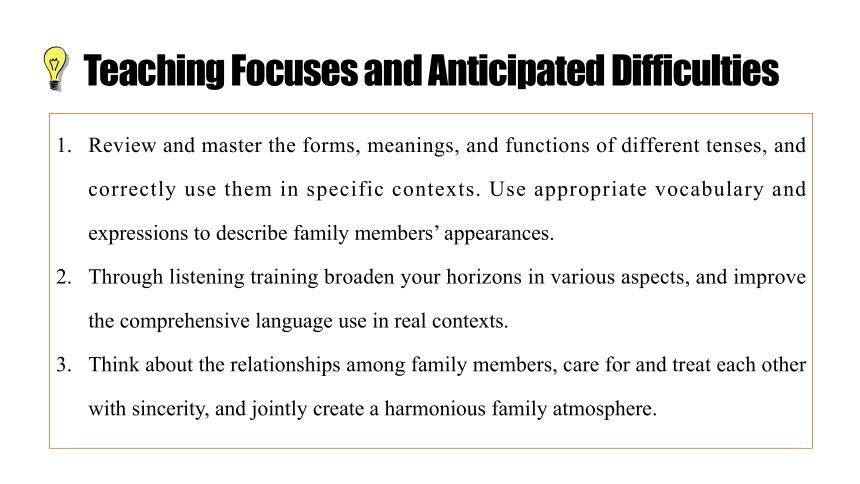

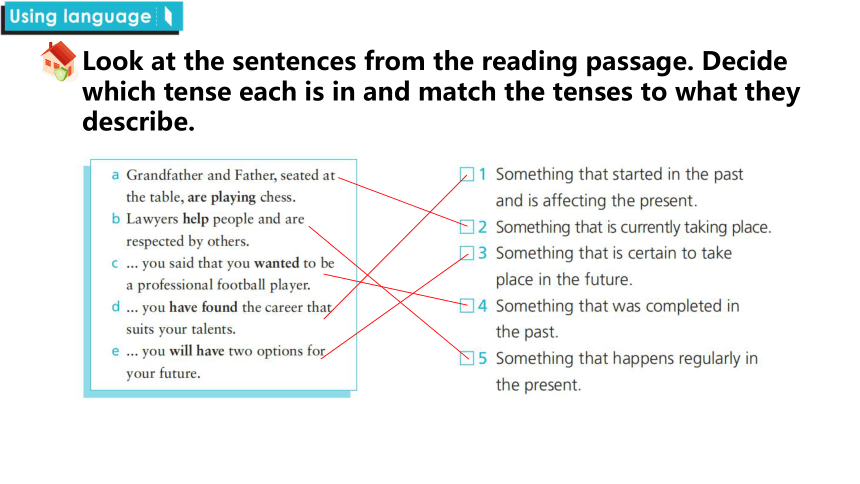
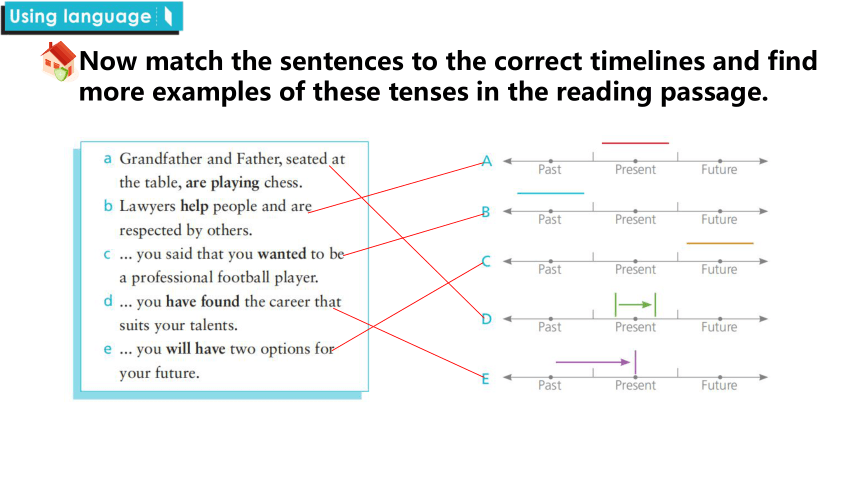
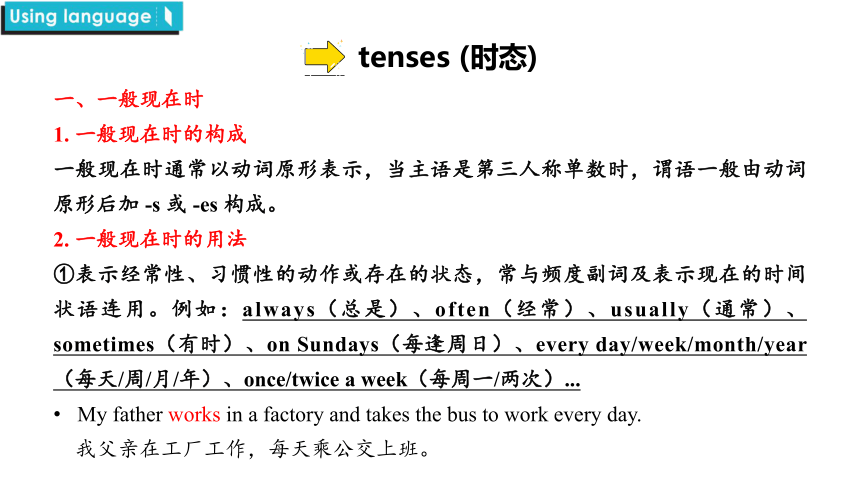
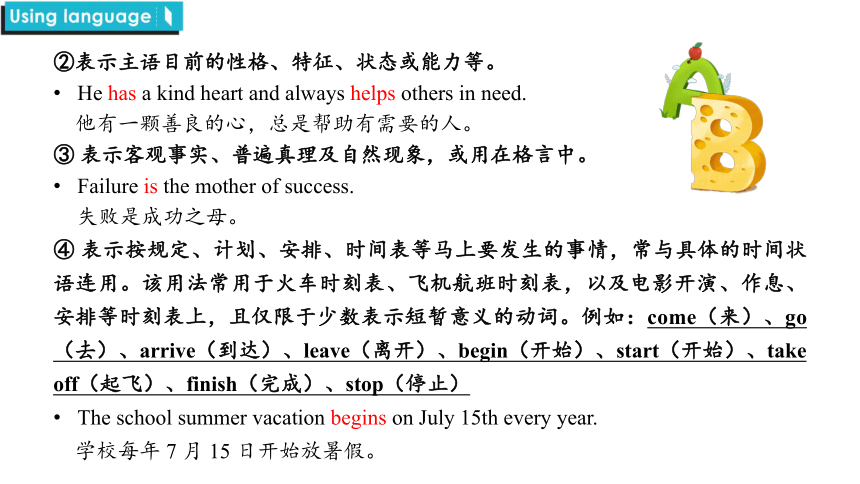

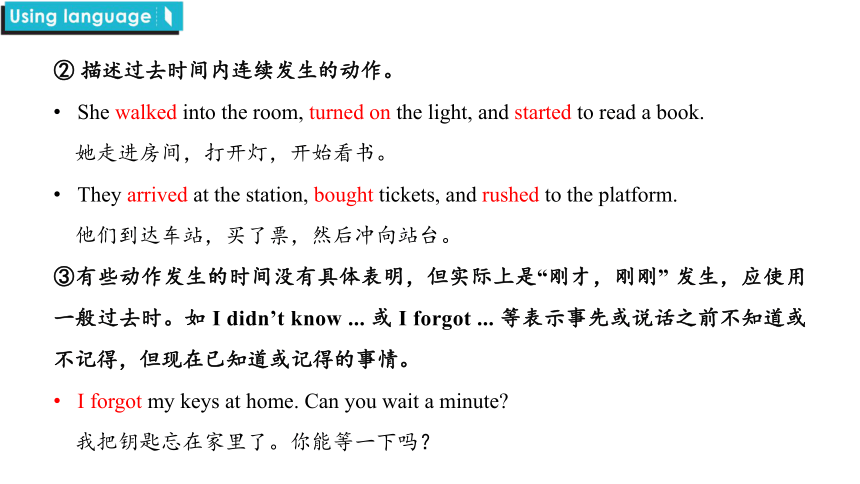
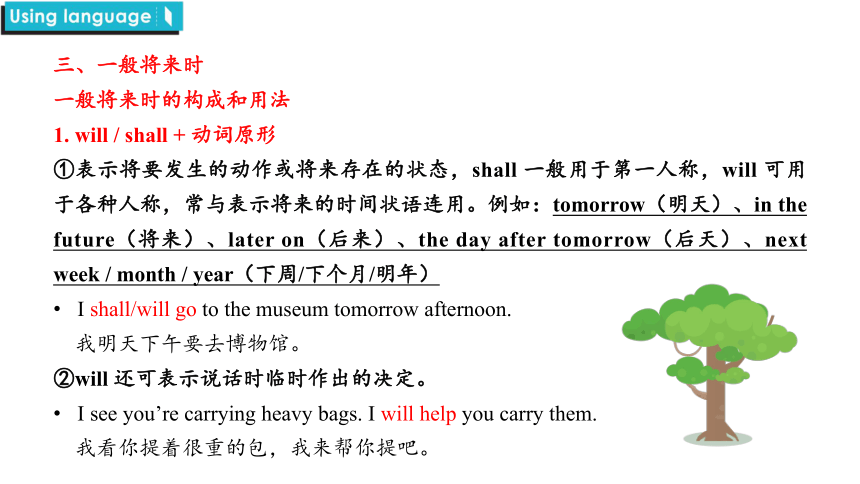
文档简介
(共42张PPT)
Unit 3
Family
matters
Using language
Learning Objectives
PART. 01
Understand the daily study and life of British middle school students by watching videos. Based on your own daily study and life, compare the study and life in Chinese and British schools, and find out the similarities and differences between the two. Talk about your first impression of high school life, and have a preliminary perception of the study and life in the senior high school stage.
Learning Objectives
Students can master the forms, meanings, and functions of different tenses, and correctly use them in specific contexts. And use appropriate vocabulary and expressions to describe family members’ appearances.
Think about the relationships among family members, care for and treat each other with sincerity, and jointly create a harmonious family atmosphere.
Understand the daily study and life of British middle school students by watching videos. Based on your own daily study and life, compare the study and life in Chinese and British schools, and find out the similarities and differences between the two. Talk about your first impression of high school life, and have a preliminary perception of the study and life in the senior high school stage.
Teaching Focuses and Anticipated Difficulties
Review and master the forms, meanings, and functions of different tenses, and correctly use them in specific contexts. Use appropriate vocabulary and expressions to describe family members’ appearances.
Through listening training broaden your horizons in various aspects, and improve the comprehensive language use in real contexts.
Think about the relationships among family members, care for and treat each other with sincerity, and jointly create a harmonious family atmosphere.
Grammar
PART. 02
Look at the sentences from the reading passage. Decide which tense each is in and match the tenses to what they describe.
Now match the sentences to the correct timelines and find more examples of these tenses in the reading passage.
tenses (时态)
一、一般现在时
1. 一般现在时的构成
一般现在时通常以动词原形表示,当主语是第三人称单数时,谓语一般由动词原形后加 -s 或 -es 构成。
2. 一般现在时的用法
①表示经常性、习惯性的动作或存在的状态,常与频度副词及表示现在的时间状语连用。例如:always(总是)、often(经常)、usually(通常)、sometimes(有时)、on Sundays(每逢周日)、every day/week/month/year(每天/周/月/年)、once/twice a week(每周一/两次)...
My father works in a factory and takes the bus to work every day.
我父亲在工厂工作,每天乘公交上班。
②表示主语目前的性格、特征、状态或能力等。
He has a kind heart and always helps others in need.
他有一颗善良的心,总是帮助有需要的人。
③ 表示客观事实、普遍真理及自然现象,或用在格言中。
Failure is the mother of success.
失败是成功之母。
④ 表示按规定、计划、安排、时间表等马上要发生的事情,常与具体的时间状语连用。该用法常用于火车时刻表、飞机航班时刻表,以及电影开演、作息、安排等时刻表上,且仅限于少数表示短暂意义的动词。例如:come(来)、go(去)、arrive(到达)、leave(离开)、begin(开始)、start(开始)、take off(起飞)、finish(完成)、stop(停止)
The school summer vacation begins on July 15th every year.
学校每年 7 月 15 日开始放暑假。
二、一般过去时
1. 一般过去时的构成
一般过去时由动词的过去式表示。
2. 一般过去时的用法
① 表示过去某一时间发生的动作或存在的状态,其中包括过去的习惯性动作,常与表示过去的时间状语连用。例如:yesterday(昨天)、in 1990(在1990年)、the other day(前几天)、once upon a time(从前)、last week / month / year(上周/上月/去年)...
They arrived in London last month and visited Big Ben.
他们上个月抵达伦敦,并参观了大本钟。
② 描述过去时间内连续发生的动作。
She walked into the room, turned on the light, and started to read a book.
她走进房间,打开灯,开始看书。
They arrived at the station, bought tickets, and rushed to the platform.
他们到达车站,买了票,然后冲向站台。
③有些动作发生的时间没有具体表明,但实际上是“刚才,刚刚” 发生,应使用一般过去时。如 I didn’t know ... 或 I forgot ... 等表示事先或说话之前不知道或不记得,但现在已知道或记得的事情。
I forgot my keys at home. Can you wait a minute
我把钥匙忘在家里了。你能等一下吗?
三、一般将来时
一般将来时的构成和用法
1. will / shall + 动词原形
①表示将要发生的动作或将来存在的状态,shall 一般用于第一人称,will 可用于各种人称,常与表示将来的时间状语连用。例如:tomorrow(明天)、in the future(将来)、later on(后来)、the day after tomorrow(后天)、next week / month / year(下周/下个月/明年)
I shall/will go to the museum tomorrow afternoon.
我明天下午要去博物馆。
②will 还可表示说话时临时作出的决定。
I see you’re carrying heavy bags. I will help you carry them.
我看你提着很重的包,我来帮你提吧。
2. be going to + 动词原形
表示按计划、打算要做某事;还可表示“预见”,即某种迹象预示着要发生某事。
I am going to learn how to play the guitar next month.
我下个月打算学弹吉他。
3. be to + 动词原形
All students are to submit their applications by Friday.
所有学生须在周五前提交申请。
4. be about to + 动词原形
表示立即要发生的动作,常译作“即将……;马上就……”,通常不与具体的时间状语连用。
The plane is about to take off, so please fasten your seatbelt.
飞机即将起飞,请系好安全带。
四、现在进行时
1. 现在进行时的构成
am / is / are + 现在分词
2. 现在进行时的用法
① 表示说话时正在发生或进行的动作,或现阶段一直进行着的动作,常与一些标志性的时间状语连用。
We are preparing for the school sports meeting these days.
我们这些天一直在准备校运动会。
② 一些非延续性动词可用现在进行时表示按计划、安排将要发生的动作,常见的这类动词有:come(来)、go(去)、leave(离开)、arrive(到达)、begin(开始)、start(开始)、return(返回)、move(移动)、take(拿走)
They are leaving for Shanghai tomorrow morning.
他们明天早上要出发去上海。
五、现在完成时
1. 现在完成时的构成
have / has + 过去分词
2. 现在完成时的用法
①表示动作或过程发生在说话之前某个没有明确说出的过去时间,但现在已经完成,且其结果对现在仍有影响。常用的时间状语有:lately(近来)、recently(最近)、so far(到目前为止)、up to / till now(直到现在)、by now(到现在)、in the last / past few days / years(在过去的几天/几年里)
He has started learning Chinese lately, and he can say some simple words now.
他最近开始学中文,现在能说一些简单的词汇了。
②表示从过去开始一直持续到现在的动作或状态,可能还会继续进行下去,常用的时间状语有:since + 时间点/从句、for + 时间段
He has worked as a teacher since he graduated from university.
他大学毕业后就一直当老师。
They have studied English for three hours today.
他们今天学了三个小时英语。
注意:瞬间动词可以用于现在完成时,但在肯定句中不能与表示一段时间的状语连用。常用的瞬间动词有:go, come, arrive, leave, begin, borrow, buy, die, fall, stop, start, kill, close, join 等。
Complete the dialogue with the correct form of the words and expressions in brackets.
Dad: Adam, Sally. come here. Mum 1_________(have) something to tell you.
Adam: Coming!
Sally: Coming!
Mum: I 2_________(call) Grandma yesterday and invited her to our house this Sunday.
We 3_________________(throw) her a big birthday party! So, we each need to choose a present.
Adam: I know — I 4__________________(give) her a new tea set. She 5_________(like) drinking tea!
Mum: Good choice. What about you, Sally
Sally: I 6_______________(think of) making a scarf for her.
Mum: Good idea. I’m sure Grandma 7_________(love) it. Oh, 8_________ you 9_________(finish) the guest list yet, dear
Dad: Yes, I have, and I’m working on the invitations.
Mum: OK. So we still need to prepare food and drinks. I’ll make a checklist.
has
called
will throw / are going to throw
will give / am going to give
likes
am thinking of
will love
have
finished
Look at the checklist for Grandma’s birthday party and talk about the preparations. Use as many of the tenses in Activity 1 as possible.
They have decided to throw a party to celebrate Grandma’s birthday ...
They have decided to throw a party to celebrate Grandma’s birthday. They have all chosen presents for Grandma. Dad drew up the guest list on Wednesday, and he is now making the invitations. Mum will prepare food and drinks for the party on Sunday morning.
Read the email and answer the questions.
From Penny To Anna
Subject A family memory
Hi Anna,
Great to hear from you! Yes, we had a fantastic holiday. Mum, Dad and I went camping in Beidaihe. In fact, we stayed at the same campsite as we did ten years ago. Dad showed me a photo we had taken then – just see how time flies!
Dad has changed quite a bit! In his thirties, he was quite thin and pale, and he had red, bushy hair. Nowadays, he’s well-built and tanned. He’s always had a square jaw, but now he’s grown a beard. Strangely, his beard is still red even though his hair is turning grey!
Mum looks almost the same, though. She still has smooth skin and straight black hair, and jogging has kept her slim and fit.
I still have light skin and black hair, of course. But I usually wear my hair in a ponytail these days as it has got a lot longer. Mum says I had cute rosy cheeks, but now I have freckles. I think they are kind of cute too, right
Can’t wait to see you back in school!
Penny
Read the email and answer the questions.
1. What did Penny’s dad look like ten years ago
He was quite thin and pale. He had red, bushy hair and a square jaw.
2. What does Penny’s mum look like now and why
She looks almost the same as she did ten years ago, with smooth skin and straight black hair, because jogging has kept her slim and fit.
3. How does Penny look different now compared to ten years ago
Her hair has got a lot longer and she wears it in a ponytail. She also has freckles on her cheeks now.
Underline the words and expressions used to describe appearances in Activity 4 and put them into the table. Add any more you can think of.
Face Hair Skin Height and build
square jaw
red beard
rosy cheeks
Freckles
thick lips
round face
handsome
red
bushy
grey
straight
black
ponytail
long
curly
loose
pale
tanned
smooth
light
sallow
wrinkled
ruddy
fair
rough
thin
well-built
slim
fit
stout
skinny
overweight
broad-shouldered
Work in pairs and describe how your family members’ physical appearances have changed.
My mother was / had...
Now she is / has got...
Listening
PART. 03
The International Day of Families, which was set by the United Nations in 1993, is held on 15 May every year. The day celebrates the importance of families. It aims to deepen people’s understanding of issues that are related to families. With a different theme each year, the day is observed with a wide range of events that are organised at local, national and international levels.
Did You Know
Listen to the conversation and choose the feelings that the speakers express.
angry
sad
embarrassed
sorry
confused
happy
Alice felt sad because her mother missed her school play.
Alice’s mother felt sorry because she was too busy and forgot Alice’s school play.
They felt happy in the end because they decided to go to the countryside the next week.
Listen again and complete Alice’s journal entry.
Today, I was in a(n) 1__________, but Mum missed it. Later, on the phone she apologised and explained that she was busy with work because someone was 2__________. I wish she had come!
I know she’s been busy recently, and I understand that. I’m just worried about her. I don’t like seeing her so 3_____________.
I think she needs to take some time off work to 4__________.
I told her my worries. To make up for it, next week we plan to go to the 5__________ together. We’ll go camping and have a(n) 6__________. Most importantly, we’ll have time to talk and 7__________. I’m really looking forward to it
Saturday 22 September
school play
off sick
tired and pale
relax
countryside
picnic
catch up
Now talk about how Alice’s mother makes an apology. Listen again if necessary.
Work in pairs. Act out the conversation to apologise to a family member.
student A
You’re Student B’s son / daughter. Student B asked you to teach him / her how to use a new app to take photos. You started to help but soon became very impatient. Now, you feel sorry about your behaviour. Apologise to Student B and make up.
Work in pairs. Act out the conversation to apologise to a family member.
student B
You’re Student A’s father / mother. You wanted to learn how to use a new photo-taking app, so you asked Student A for help. However, he / she was very impatient. Now Student A wants to apologise to you. Accept the apology and comfort him / her.
Work in pairs. Think about a problem that has come
up between you and your friends and have a similar conversation.
Placing stress on particular words can have a big impact on the meaning and strength of apologies. For example, saying “I am sorry” has more of an impact than “I’m sorry”. Another way of strengthening an apology is by using and stressing adverbs: I’m really sorry, I’m so sorry.
Learning to learn
Vocabulary
1. responsible
responsibility n. 责任,责任心,职责
be responsible for 应对……负责
be responsible to sb. 对某人负责
bear responsibility for 对……负有责任
take the responsibility for/of doing sth. 负起对做某事的责任
例题:
Teachers are responsible ______ creating a positive learning environment for students.
for
Vocabulary
2. aim
with the aim of… 为了……
without aim 漫无目的地
take aim at sb./sth. 向某人/某事开火,批评某人/某事
aim… at… 用……瞄准/对准……
be aimed at… 旨在,目的在于
aim to do sth./aim at doing sth. 旨在做……,打算做……
例题:
The charity organization aims __________(provide) clean water for communities in need.
to provide
Vocabulary
3. observe
observe sb. do sth. 看到某人做(过)某事
observe sb. doing sth. 看到某人(正在)做某事
例题:
The teacher observed the students _________(work) together in groups, discussing the problem with great enthusiasm.
working
Vocabulary
4. range
a range of 一系列……
in/within range 在射程以内,在……范围内
beyond/out of range 在射程外,在……范围外
range from… to… 在……范围内变动
range between… and… 在……和……范围内变动
out of one’s range 某人能力达不到的
例题:
Her daily activities range _______ working in the office to volunteering at the local animal shelter.
from
Vocabulary
5. apologise
apology n. 道歉,致歉
apologise (to sb.) for (doing) sth. 为(做了)某事(向某人)道歉
accept an apology 接受道歉
make/offer an apology to sb. for (doing) sth. 为(做了)某事向某人道歉
owe sb. an apology 应向某人道歉
例题:
The company offered an apology _______ its customers for the delay in delivery.
to
Exercise
PART. 04
1. She is c________(当前) working on a new project that aims to reduce plastic waste in oceans.
2. Many traditional industries are adapting to digital trends n__________(现今) to stay competitive.
3. The new policy will have a significant i_______(影响) on small businesses across the country.
4. The old photo album holds precious m_________(记忆) of her grandparents’ wedding and family gatherings over the years.
urrently
Exercise: 单词拼写
owadays
mpact
emories
1. In art class, students learn to improve their drawing skills by practicing careful _____________ (observe) of shapes and shadows.
2. Many countries celebrate their ________(nation) holidays with parades and fireworks.
3. As a citizen, voting in elections is both a right and a _____________(responsible).
4. We should check the equipment __________(regular) to ensure it functions safely and efficiently.
5. She wrote a detailed __________(apologise) letter to explain her actions and express regret for hurting her colleague.
observation
Exercise: 用所给词的适当形式填空
national
responsibility
regularly
apology
Summary
PART. 05
Using language
Grammar
Vocabulary
Listening
时态
一般现在时
一般将来时
一般过去时
现在进行时
现在完成时
Homework
PART. 06
Review what you have learnt in this class;
Think about a problem that has come up between you and your friends and have a similar conversation.
Homework
See you next class!
Unit 3
Family
matters
Using language
Learning Objectives
PART. 01
Understand the daily study and life of British middle school students by watching videos. Based on your own daily study and life, compare the study and life in Chinese and British schools, and find out the similarities and differences between the two. Talk about your first impression of high school life, and have a preliminary perception of the study and life in the senior high school stage.
Learning Objectives
Students can master the forms, meanings, and functions of different tenses, and correctly use them in specific contexts. And use appropriate vocabulary and expressions to describe family members’ appearances.
Think about the relationships among family members, care for and treat each other with sincerity, and jointly create a harmonious family atmosphere.
Understand the daily study and life of British middle school students by watching videos. Based on your own daily study and life, compare the study and life in Chinese and British schools, and find out the similarities and differences between the two. Talk about your first impression of high school life, and have a preliminary perception of the study and life in the senior high school stage.
Teaching Focuses and Anticipated Difficulties
Review and master the forms, meanings, and functions of different tenses, and correctly use them in specific contexts. Use appropriate vocabulary and expressions to describe family members’ appearances.
Through listening training broaden your horizons in various aspects, and improve the comprehensive language use in real contexts.
Think about the relationships among family members, care for and treat each other with sincerity, and jointly create a harmonious family atmosphere.
Grammar
PART. 02
Look at the sentences from the reading passage. Decide which tense each is in and match the tenses to what they describe.
Now match the sentences to the correct timelines and find more examples of these tenses in the reading passage.
tenses (时态)
一、一般现在时
1. 一般现在时的构成
一般现在时通常以动词原形表示,当主语是第三人称单数时,谓语一般由动词原形后加 -s 或 -es 构成。
2. 一般现在时的用法
①表示经常性、习惯性的动作或存在的状态,常与频度副词及表示现在的时间状语连用。例如:always(总是)、often(经常)、usually(通常)、sometimes(有时)、on Sundays(每逢周日)、every day/week/month/year(每天/周/月/年)、once/twice a week(每周一/两次)...
My father works in a factory and takes the bus to work every day.
我父亲在工厂工作,每天乘公交上班。
②表示主语目前的性格、特征、状态或能力等。
He has a kind heart and always helps others in need.
他有一颗善良的心,总是帮助有需要的人。
③ 表示客观事实、普遍真理及自然现象,或用在格言中。
Failure is the mother of success.
失败是成功之母。
④ 表示按规定、计划、安排、时间表等马上要发生的事情,常与具体的时间状语连用。该用法常用于火车时刻表、飞机航班时刻表,以及电影开演、作息、安排等时刻表上,且仅限于少数表示短暂意义的动词。例如:come(来)、go(去)、arrive(到达)、leave(离开)、begin(开始)、start(开始)、take off(起飞)、finish(完成)、stop(停止)
The school summer vacation begins on July 15th every year.
学校每年 7 月 15 日开始放暑假。
二、一般过去时
1. 一般过去时的构成
一般过去时由动词的过去式表示。
2. 一般过去时的用法
① 表示过去某一时间发生的动作或存在的状态,其中包括过去的习惯性动作,常与表示过去的时间状语连用。例如:yesterday(昨天)、in 1990(在1990年)、the other day(前几天)、once upon a time(从前)、last week / month / year(上周/上月/去年)...
They arrived in London last month and visited Big Ben.
他们上个月抵达伦敦,并参观了大本钟。
② 描述过去时间内连续发生的动作。
She walked into the room, turned on the light, and started to read a book.
她走进房间,打开灯,开始看书。
They arrived at the station, bought tickets, and rushed to the platform.
他们到达车站,买了票,然后冲向站台。
③有些动作发生的时间没有具体表明,但实际上是“刚才,刚刚” 发生,应使用一般过去时。如 I didn’t know ... 或 I forgot ... 等表示事先或说话之前不知道或不记得,但现在已知道或记得的事情。
I forgot my keys at home. Can you wait a minute
我把钥匙忘在家里了。你能等一下吗?
三、一般将来时
一般将来时的构成和用法
1. will / shall + 动词原形
①表示将要发生的动作或将来存在的状态,shall 一般用于第一人称,will 可用于各种人称,常与表示将来的时间状语连用。例如:tomorrow(明天)、in the future(将来)、later on(后来)、the day after tomorrow(后天)、next week / month / year(下周/下个月/明年)
I shall/will go to the museum tomorrow afternoon.
我明天下午要去博物馆。
②will 还可表示说话时临时作出的决定。
I see you’re carrying heavy bags. I will help you carry them.
我看你提着很重的包,我来帮你提吧。
2. be going to + 动词原形
表示按计划、打算要做某事;还可表示“预见”,即某种迹象预示着要发生某事。
I am going to learn how to play the guitar next month.
我下个月打算学弹吉他。
3. be to + 动词原形
All students are to submit their applications by Friday.
所有学生须在周五前提交申请。
4. be about to + 动词原形
表示立即要发生的动作,常译作“即将……;马上就……”,通常不与具体的时间状语连用。
The plane is about to take off, so please fasten your seatbelt.
飞机即将起飞,请系好安全带。
四、现在进行时
1. 现在进行时的构成
am / is / are + 现在分词
2. 现在进行时的用法
① 表示说话时正在发生或进行的动作,或现阶段一直进行着的动作,常与一些标志性的时间状语连用。
We are preparing for the school sports meeting these days.
我们这些天一直在准备校运动会。
② 一些非延续性动词可用现在进行时表示按计划、安排将要发生的动作,常见的这类动词有:come(来)、go(去)、leave(离开)、arrive(到达)、begin(开始)、start(开始)、return(返回)、move(移动)、take(拿走)
They are leaving for Shanghai tomorrow morning.
他们明天早上要出发去上海。
五、现在完成时
1. 现在完成时的构成
have / has + 过去分词
2. 现在完成时的用法
①表示动作或过程发生在说话之前某个没有明确说出的过去时间,但现在已经完成,且其结果对现在仍有影响。常用的时间状语有:lately(近来)、recently(最近)、so far(到目前为止)、up to / till now(直到现在)、by now(到现在)、in the last / past few days / years(在过去的几天/几年里)
He has started learning Chinese lately, and he can say some simple words now.
他最近开始学中文,现在能说一些简单的词汇了。
②表示从过去开始一直持续到现在的动作或状态,可能还会继续进行下去,常用的时间状语有:since + 时间点/从句、for + 时间段
He has worked as a teacher since he graduated from university.
他大学毕业后就一直当老师。
They have studied English for three hours today.
他们今天学了三个小时英语。
注意:瞬间动词可以用于现在完成时,但在肯定句中不能与表示一段时间的状语连用。常用的瞬间动词有:go, come, arrive, leave, begin, borrow, buy, die, fall, stop, start, kill, close, join 等。
Complete the dialogue with the correct form of the words and expressions in brackets.
Dad: Adam, Sally. come here. Mum 1_________(have) something to tell you.
Adam: Coming!
Sally: Coming!
Mum: I 2_________(call) Grandma yesterday and invited her to our house this Sunday.
We 3_________________(throw) her a big birthday party! So, we each need to choose a present.
Adam: I know — I 4__________________(give) her a new tea set. She 5_________(like) drinking tea!
Mum: Good choice. What about you, Sally
Sally: I 6_______________(think of) making a scarf for her.
Mum: Good idea. I’m sure Grandma 7_________(love) it. Oh, 8_________ you 9_________(finish) the guest list yet, dear
Dad: Yes, I have, and I’m working on the invitations.
Mum: OK. So we still need to prepare food and drinks. I’ll make a checklist.
has
called
will throw / are going to throw
will give / am going to give
likes
am thinking of
will love
have
finished
Look at the checklist for Grandma’s birthday party and talk about the preparations. Use as many of the tenses in Activity 1 as possible.
They have decided to throw a party to celebrate Grandma’s birthday ...
They have decided to throw a party to celebrate Grandma’s birthday. They have all chosen presents for Grandma. Dad drew up the guest list on Wednesday, and he is now making the invitations. Mum will prepare food and drinks for the party on Sunday morning.
Read the email and answer the questions.
From Penny To Anna
Subject A family memory
Hi Anna,
Great to hear from you! Yes, we had a fantastic holiday. Mum, Dad and I went camping in Beidaihe. In fact, we stayed at the same campsite as we did ten years ago. Dad showed me a photo we had taken then – just see how time flies!
Dad has changed quite a bit! In his thirties, he was quite thin and pale, and he had red, bushy hair. Nowadays, he’s well-built and tanned. He’s always had a square jaw, but now he’s grown a beard. Strangely, his beard is still red even though his hair is turning grey!
Mum looks almost the same, though. She still has smooth skin and straight black hair, and jogging has kept her slim and fit.
I still have light skin and black hair, of course. But I usually wear my hair in a ponytail these days as it has got a lot longer. Mum says I had cute rosy cheeks, but now I have freckles. I think they are kind of cute too, right
Can’t wait to see you back in school!
Penny
Read the email and answer the questions.
1. What did Penny’s dad look like ten years ago
He was quite thin and pale. He had red, bushy hair and a square jaw.
2. What does Penny’s mum look like now and why
She looks almost the same as she did ten years ago, with smooth skin and straight black hair, because jogging has kept her slim and fit.
3. How does Penny look different now compared to ten years ago
Her hair has got a lot longer and she wears it in a ponytail. She also has freckles on her cheeks now.
Underline the words and expressions used to describe appearances in Activity 4 and put them into the table. Add any more you can think of.
Face Hair Skin Height and build
square jaw
red beard
rosy cheeks
Freckles
thick lips
round face
handsome
red
bushy
grey
straight
black
ponytail
long
curly
loose
pale
tanned
smooth
light
sallow
wrinkled
ruddy
fair
rough
thin
well-built
slim
fit
stout
skinny
overweight
broad-shouldered
Work in pairs and describe how your family members’ physical appearances have changed.
My mother was / had...
Now she is / has got...
Listening
PART. 03
The International Day of Families, which was set by the United Nations in 1993, is held on 15 May every year. The day celebrates the importance of families. It aims to deepen people’s understanding of issues that are related to families. With a different theme each year, the day is observed with a wide range of events that are organised at local, national and international levels.
Did You Know
Listen to the conversation and choose the feelings that the speakers express.
angry
sad
embarrassed
sorry
confused
happy
Alice felt sad because her mother missed her school play.
Alice’s mother felt sorry because she was too busy and forgot Alice’s school play.
They felt happy in the end because they decided to go to the countryside the next week.
Listen again and complete Alice’s journal entry.
Today, I was in a(n) 1__________, but Mum missed it. Later, on the phone she apologised and explained that she was busy with work because someone was 2__________. I wish she had come!
I know she’s been busy recently, and I understand that. I’m just worried about her. I don’t like seeing her so 3_____________.
I think she needs to take some time off work to 4__________.
I told her my worries. To make up for it, next week we plan to go to the 5__________ together. We’ll go camping and have a(n) 6__________. Most importantly, we’ll have time to talk and 7__________. I’m really looking forward to it
Saturday 22 September
school play
off sick
tired and pale
relax
countryside
picnic
catch up
Now talk about how Alice’s mother makes an apology. Listen again if necessary.
Work in pairs. Act out the conversation to apologise to a family member.
student A
You’re Student B’s son / daughter. Student B asked you to teach him / her how to use a new app to take photos. You started to help but soon became very impatient. Now, you feel sorry about your behaviour. Apologise to Student B and make up.
Work in pairs. Act out the conversation to apologise to a family member.
student B
You’re Student A’s father / mother. You wanted to learn how to use a new photo-taking app, so you asked Student A for help. However, he / she was very impatient. Now Student A wants to apologise to you. Accept the apology and comfort him / her.
Work in pairs. Think about a problem that has come
up between you and your friends and have a similar conversation.
Placing stress on particular words can have a big impact on the meaning and strength of apologies. For example, saying “I am sorry” has more of an impact than “I’m sorry”. Another way of strengthening an apology is by using and stressing adverbs: I’m really sorry, I’m so sorry.
Learning to learn
Vocabulary
1. responsible
responsibility n. 责任,责任心,职责
be responsible for 应对……负责
be responsible to sb. 对某人负责
bear responsibility for 对……负有责任
take the responsibility for/of doing sth. 负起对做某事的责任
例题:
Teachers are responsible ______ creating a positive learning environment for students.
for
Vocabulary
2. aim
with the aim of… 为了……
without aim 漫无目的地
take aim at sb./sth. 向某人/某事开火,批评某人/某事
aim… at… 用……瞄准/对准……
be aimed at… 旨在,目的在于
aim to do sth./aim at doing sth. 旨在做……,打算做……
例题:
The charity organization aims __________(provide) clean water for communities in need.
to provide
Vocabulary
3. observe
observe sb. do sth. 看到某人做(过)某事
observe sb. doing sth. 看到某人(正在)做某事
例题:
The teacher observed the students _________(work) together in groups, discussing the problem with great enthusiasm.
working
Vocabulary
4. range
a range of 一系列……
in/within range 在射程以内,在……范围内
beyond/out of range 在射程外,在……范围外
range from… to… 在……范围内变动
range between… and… 在……和……范围内变动
out of one’s range 某人能力达不到的
例题:
Her daily activities range _______ working in the office to volunteering at the local animal shelter.
from
Vocabulary
5. apologise
apology n. 道歉,致歉
apologise (to sb.) for (doing) sth. 为(做了)某事(向某人)道歉
accept an apology 接受道歉
make/offer an apology to sb. for (doing) sth. 为(做了)某事向某人道歉
owe sb. an apology 应向某人道歉
例题:
The company offered an apology _______ its customers for the delay in delivery.
to
Exercise
PART. 04
1. She is c________(当前) working on a new project that aims to reduce plastic waste in oceans.
2. Many traditional industries are adapting to digital trends n__________(现今) to stay competitive.
3. The new policy will have a significant i_______(影响) on small businesses across the country.
4. The old photo album holds precious m_________(记忆) of her grandparents’ wedding and family gatherings over the years.
urrently
Exercise: 单词拼写
owadays
mpact
emories
1. In art class, students learn to improve their drawing skills by practicing careful _____________ (observe) of shapes and shadows.
2. Many countries celebrate their ________(nation) holidays with parades and fireworks.
3. As a citizen, voting in elections is both a right and a _____________(responsible).
4. We should check the equipment __________(regular) to ensure it functions safely and efficiently.
5. She wrote a detailed __________(apologise) letter to explain her actions and express regret for hurting her colleague.
observation
Exercise: 用所给词的适当形式填空
national
responsibility
regularly
apology
Summary
PART. 05
Using language
Grammar
Vocabulary
Listening
时态
一般现在时
一般将来时
一般过去时
现在进行时
现在完成时
Homework
PART. 06
Review what you have learnt in this class;
Think about a problem that has come up between you and your friends and have a similar conversation.
Homework
See you next class!
